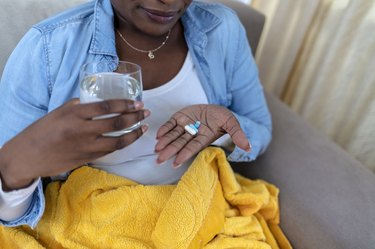
Silica supplements may help strengthen bones, improve skin health and prevent thinning hair. Most contain safe silica derived from horsetail extract. Still, there are still certain safety considerations, and knowing about silica supplements' dangers can help you avoid any adverse effects.
As a background, silica — or silicon dioxide — is a compound consisting of silicon and oxygen. According to a May 2013 review in the International Journal of Endocrinology, it's naturally found in foods like:
Video of the Day
Video of the Day
- Whole grains like oats, barely and cereals
- Vegetables like leafy greens and green beans
- Beer
It's also used as a supplement, food additive and anti-clumping agent, all of which contain forms of silica that the U.S. Food and Drug Administration (FDA) has approved. People often take supplements to reap the purported benefits of silica, like stronger hair, skin and nails; improved bone health and potentially even enhanced immune function.
However, silica is bad for you in certain contexts. Below, we outline whether there are any silica side effects to watch out for and explain other silica supplement dangers to be aware of.
How Much Silica Is Safe?
According to a January 2013 review in Nutrition & Metabolism, the safe upper limit for silicon dioxide is 700 milligrams per day for adults. But even if you exceed this limit, an overdose is unlikely, per a January 2018 review in the European Food Safety Authority Journal, which reported no symptoms of taking too much silica with doses as high as 9,000 milligrams per kilogram of body weight.
Silica pills and drops have varying concentrations, depending on the brand. NOW Foods Silica Complex, for example, contains 40 milligrams of silica per serving, while BioSil has only 5 milligrams. Accordingly, make sure to read supplement labels to determine how much silica you're taking.
And when it comes to food, the FDA stipulates that silica should not exceed two percent of a product's total weight.
1. Supplements Aren't Regulated by the FDA
Is silica safe? In short, yes — research thus far suggests that silica capsules don't have any major side effects. There are likewise no silica side effects on skin that have been reported in the research.
However, more studies are needed to further test silica pills' safety and efficacy, according to a May/June 2016 review in Anais Brasileiros de Dermatologia.
Additionally, the FDA does not review or test supplements, so there is no guarantee that a silica vitamin product is as safe or as effective as manufacturers claim. Therefore, it's your responsibility as a customer to check the labels and make an informed decision.
Tip
Talk to your doctor before trying any supplement to make sure it's right for you, according to the Mayo Clinic.
2. They May Not Be Safe for Pregnant People
Supplements — including silica — may pose side effects or risks if you're pregnant or breastfeeding, according to the Mayo Clinic.
As a result, it's best to skip the supplement (though the small amounts of natural silica found in food are OK).
Tip
In general, it's recommended to avoid taking supplements when pregnant unless your doctor instructs you to use them, according to the Mayo Clinic.
3. Crystalline Silica Is Toxic
Silica also exists in crystalline forms, according to the National Center for Biotechnology Information. These crystalline varieties are used in various industries like construction, mining, glass and agriculture, and can be toxic, per the Occupational Safety and Health Administration (OSHA).
On-the-job exposure to crystalline silica may result in lung damage. When inhaled, this compound can lead to scarring and nodules, according to the OSHA. If the nodules grow too big, you may experience breathing problems. Over time, this can lead to the following diseases:
- Chronic obstructive pulmonary disease
- Kidney disease
- Lung cancer
Crystalline versions of the compound may also cause an incurable, fatal condition known as silicosis, per the OSHA. It typically occurs 10 to 15 years after occupational exposure to crystalline silica.
This type of exposure is more likely to affect those who work in certain industries like construction, per the OSHA. Activities that involve drilling, sawing, grinding, cutting and crushing of rock, concrete, bricks, glass, stones or mortar pose the greatest risk.
Tip
Supplements contain safe, non-crystalline forms of the mineral that are FDA-approved and unlikely to cause side effects, according to the Nutrition & Metabolism review, which is why silica supplement dangers are minimal.
- OSHA: "Silica, Crystalline"
- BMC Nutrition & Metabolism: "Biological and Therapeutic Effects of Ortho-Silicic Acid and Some Ortho-Silicic Acid-Releasing Compounds: New Perspectives for Therapy"
- NCBI: "Dietary Silicon Interacts With Oestrogen to Influence Bone Health: Evidence From the Aberdeen Prospective Osteoporosis Screening Study"
- Anais Brasileiros de Dermatologia: "Use of Silicon for Skin and Hair Care: An Approach of Chemical Forms Available and Efficacy"
- FDA: "CFR - Code of Federal Regulations Title 21 - Silicon Dioxide"
- FDA: "FDA 101: Dietary Supplements"
- International Journal of Endocrinology: "Silicon: a review of its potential role in the prevention and treatment of postmenopausal osteoporosis"
- Mayo Clinic: "Supplements: Nutrition in a pill?"
- Mayo Clinic: "Should women take supplements while pregnant?"
- European Food Safety Authority Journal: "Re-evaluation of silicon dioxide (E 551) as a food additive"